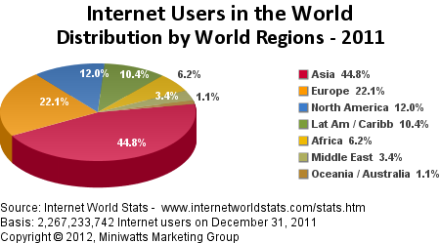Notable quote by Clay Shirky from Chapter Two:
“Human motivations change little over the years, but opportunity can change a little or a lot, depending on the social environment.”
I agree with Shirky’s idea that the separation between cyberspace and the real world is almost non-existent. The real and virtual worlds are definitely becoming one. I think most people don’t see the internet as something apart from them. They feel like they are intertwined with it. They use it in their everyday actions. They use it to check on news updates, communicate with friends, shop, and a multitude of other activities. It is an extension of who they are and lets them express their feelings and thoughts to others on a massive scale or on a private if they so chose.
I see this happening in my everyday life, especially with my wife. She’s really connected to the virtual world. If I need to check on her mood or see how her day is going, I just go to Facebook! Mostly I see it used as a tool to communicate and not as a person’s identity. Why bother making a single phone call to one person to discuss how lousy or good your day was when you can share it on Facebook for all your friends to see and comment on? Also, the information can be viewed and consumed by others when it is convenient. The biggest characteristic to the merge of the two worlds is the frequency of its uses and the ease of it use. With the virtual world so easily and readily accessible, it makes sense to use the tool to whatever advantage you deem necessary.
Shirky does present some valid points regarding the similarities of the printing press revolution and the current revolution. Both revolutions make the dissemination of information easy and cheap, compared to its previous method. Also, both revolutions increased a person’s efficiency and speed at creating mass media. The difference between the two revolutions is in regards to Gutenberg economics. During the print revolution, the printer bore all the risk associated with printing and if the material was of poor quality, he could ultimately go bankrupt. The current revolution lacks the risk associated with the press revolution. Bloggers can write all they want with no monetary consequence to them if the writing is of poor quality. Also, anyone can reach mass audiences as long as they have internet access. A person no longer requires a printing press or to be published for this purpose.
Operating in a culture of abundance devalues whatever is in abundance. Operating in a culture of scarcity makes the item more valuable. This is just a fancy way of discussing the concepts of supply and demand and the theories hold true for information as well as tangible items. Take for example news reporting. Traditionally my generation would watch TV every night at Eleven o’clock to get our daily fix and it was deemed scarce and valuable. Today, news is in abundance everywhere you look on the internet and this abundance devalues its importance and validity to a certain degree. As the users of this information, the burden is upon us to decipher what is relevant and important. I strongly believe that the internet has become the “too much information highway”.
How we find out about news and information has significantly evolved of the past 10 years. The internet has replaced the Eleven o’clock news and the daily paper. My favorite thing to say is “that’s the rumor on Facebook” in response to inquiries about a recent news event. Even though I’m being sarcastic, to a degree this is mostly true. I support the theory that citizen reporters and journalists have changed the way we find out about news and events in a positive sense. I think the feed of information keeps citizens informed and allows us to question when the facts don’t appear truthful. The news on the net can be raw and unedited and I think this is a plus also. We don’t need the mega media mainstream to decipher what we should be reading, put it all out there and let the consumer decide what is relevant. The useless and insignificant information will fall by the wayside.
In conclusion the chapter two reading was excellent. I like the way Shirky breaks it down for easy understanding and uses current examples to drive home his points. Some of the information was surprising. I never thought that South Korea was the most “connected” country on the planet. I thought for sure it was The United States or one of the more politically mature countries. Even more surprising was how a “boy-band” website provided the means to start major uprising against a countries leadership. Media is the connective tissue of society!
Additional information on Shirky’s site:
References: Cognitive Surplus by Clay Shirky Chapter Two

